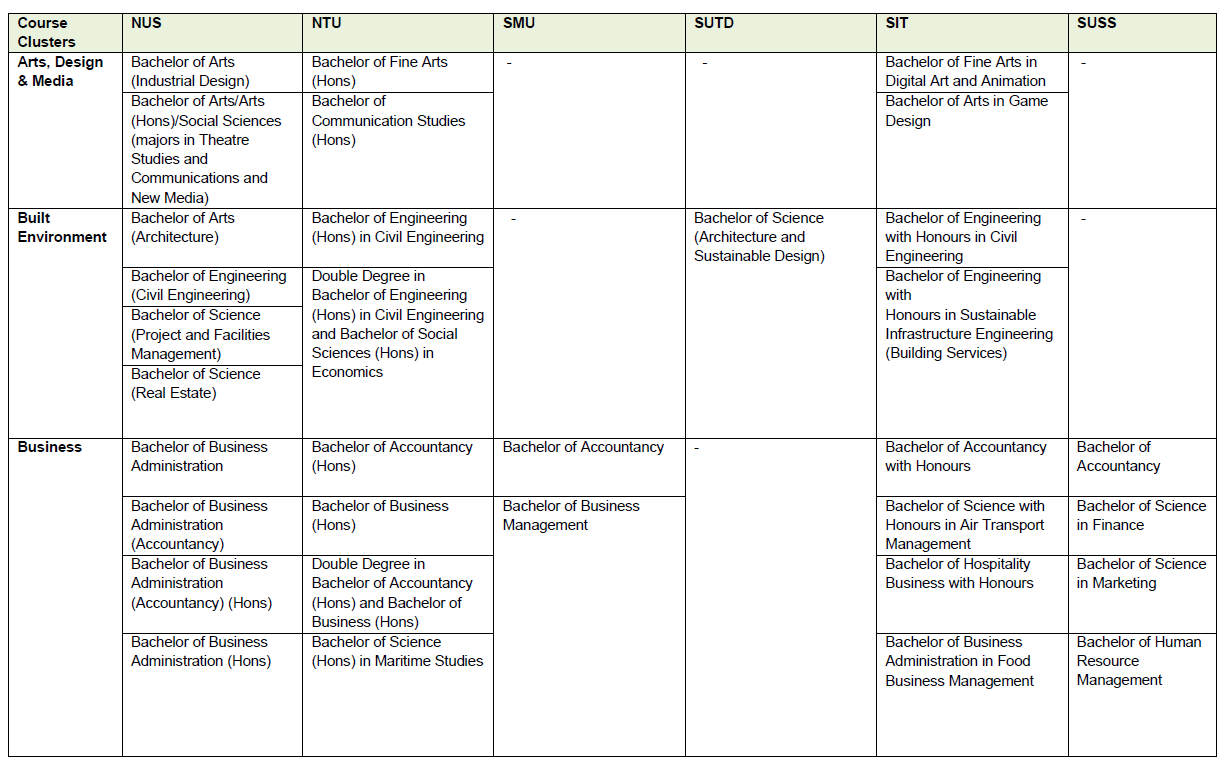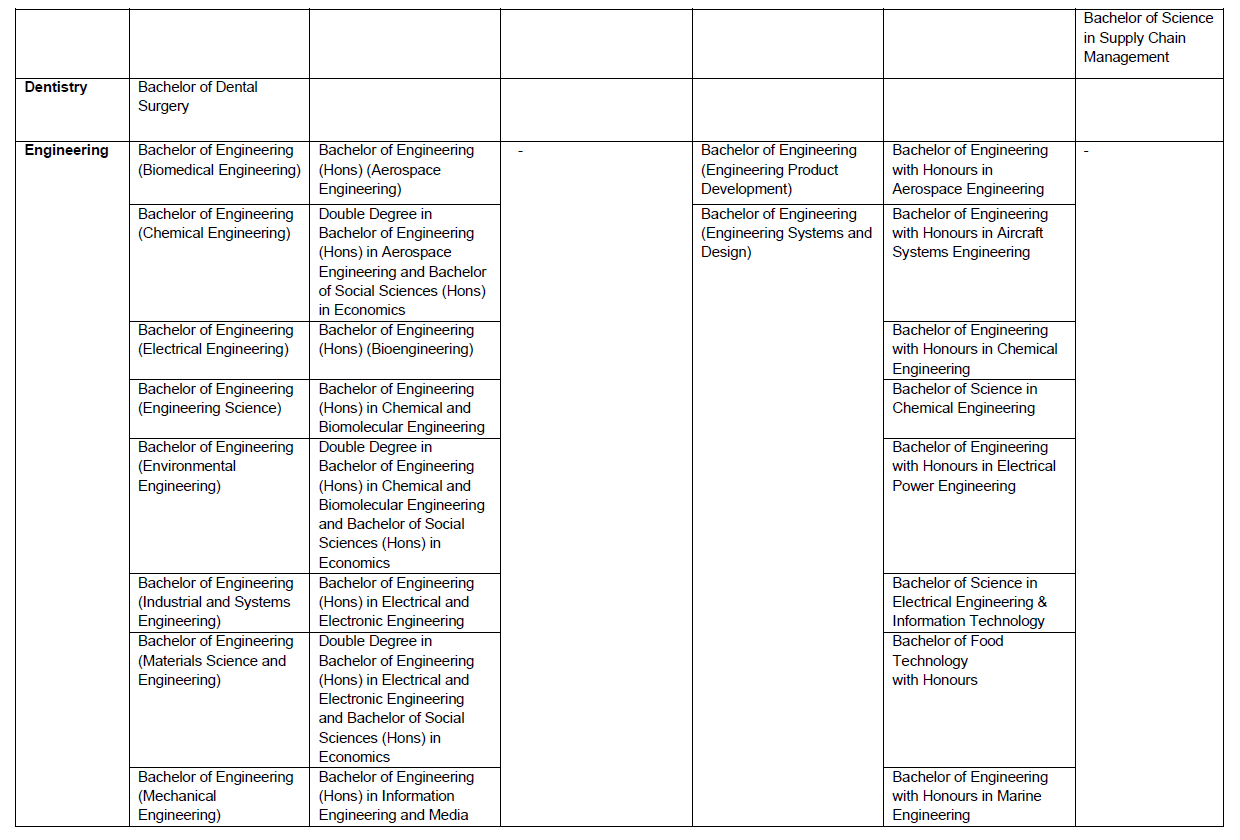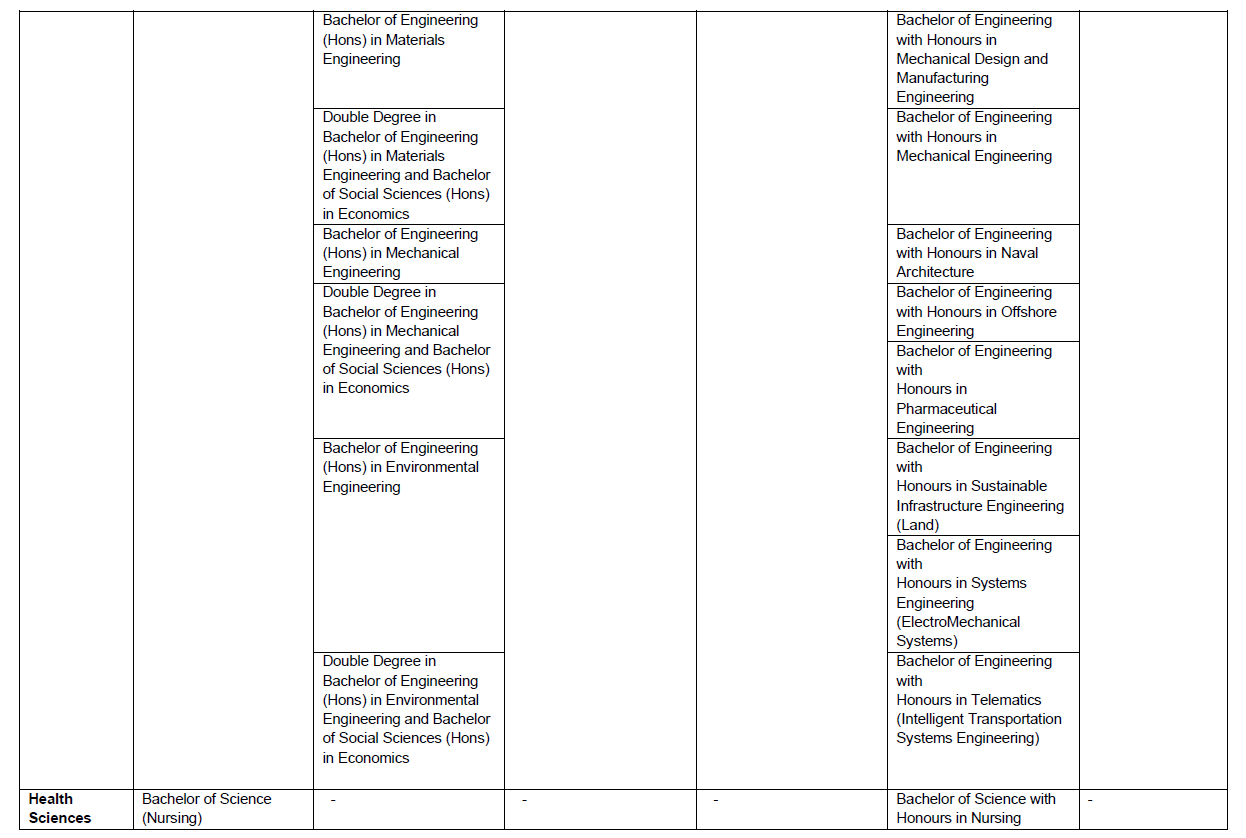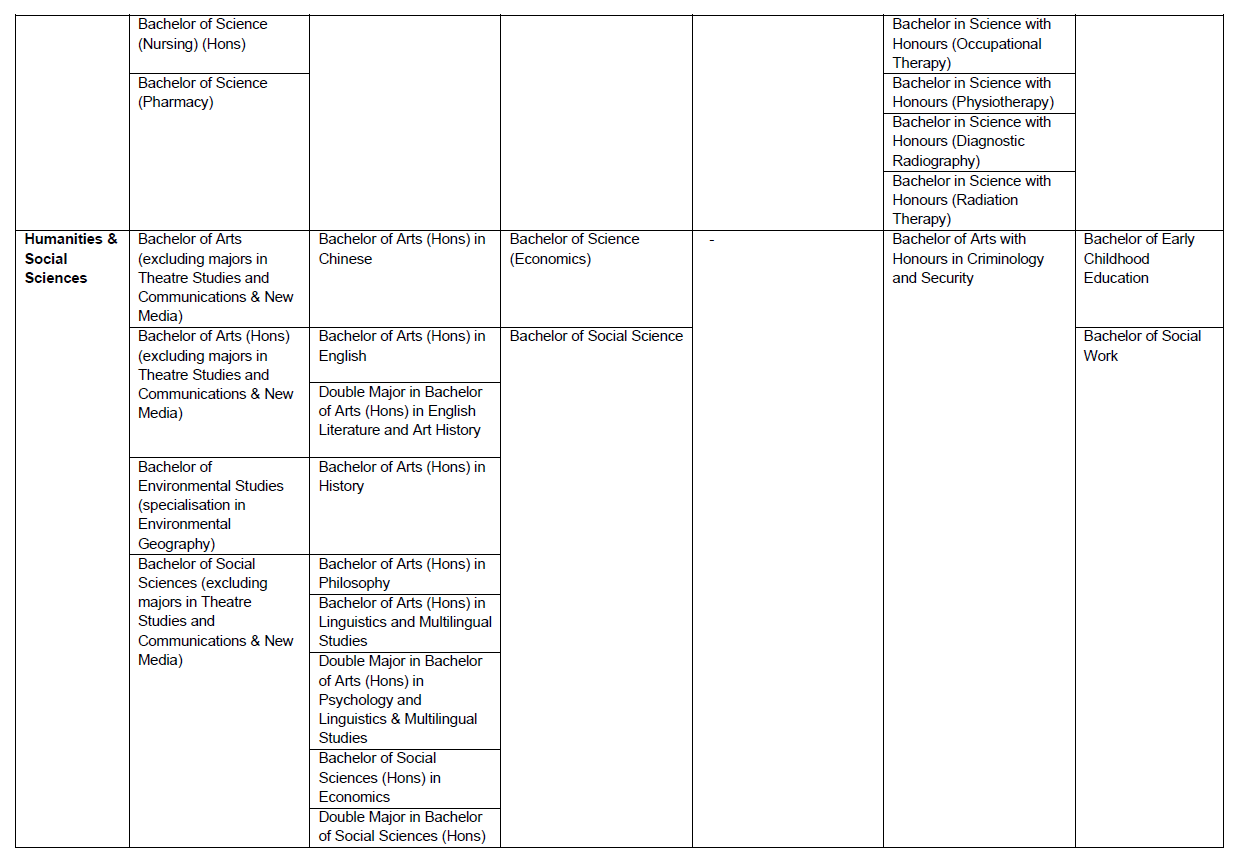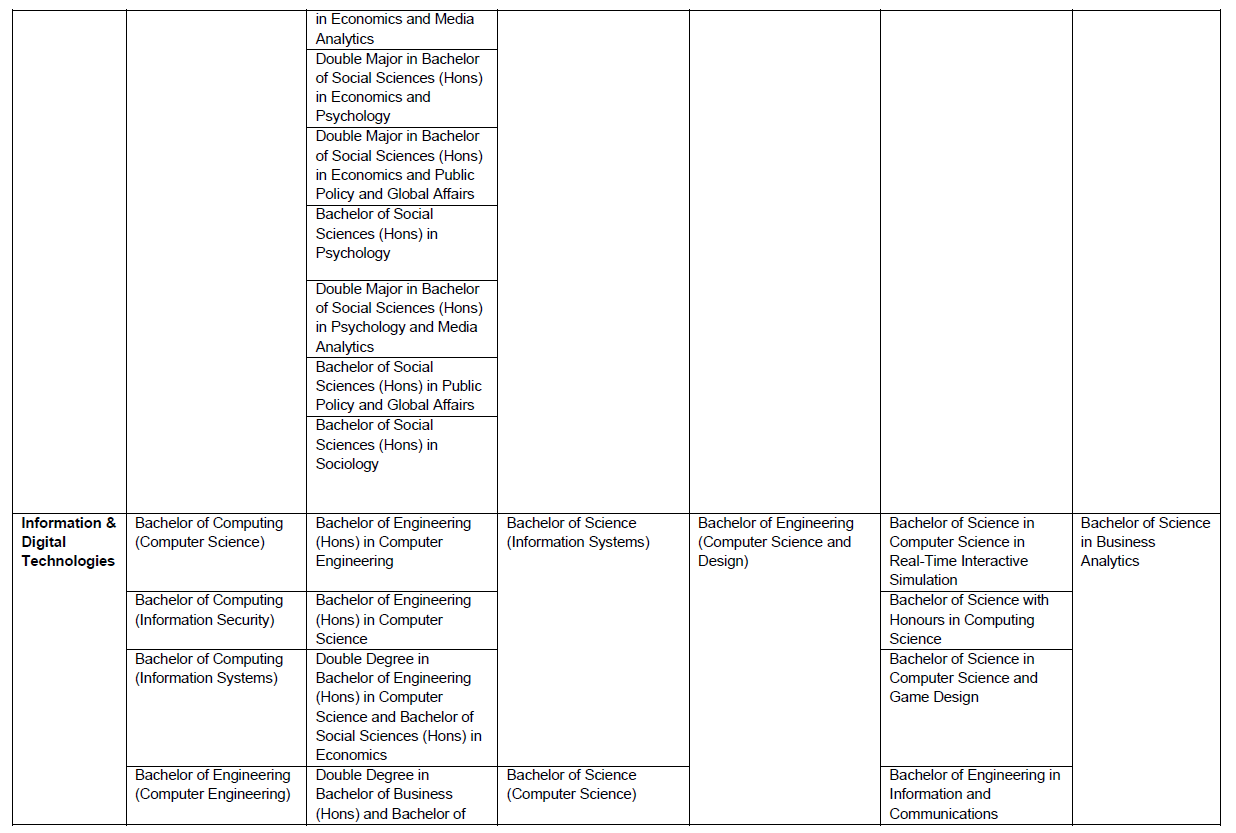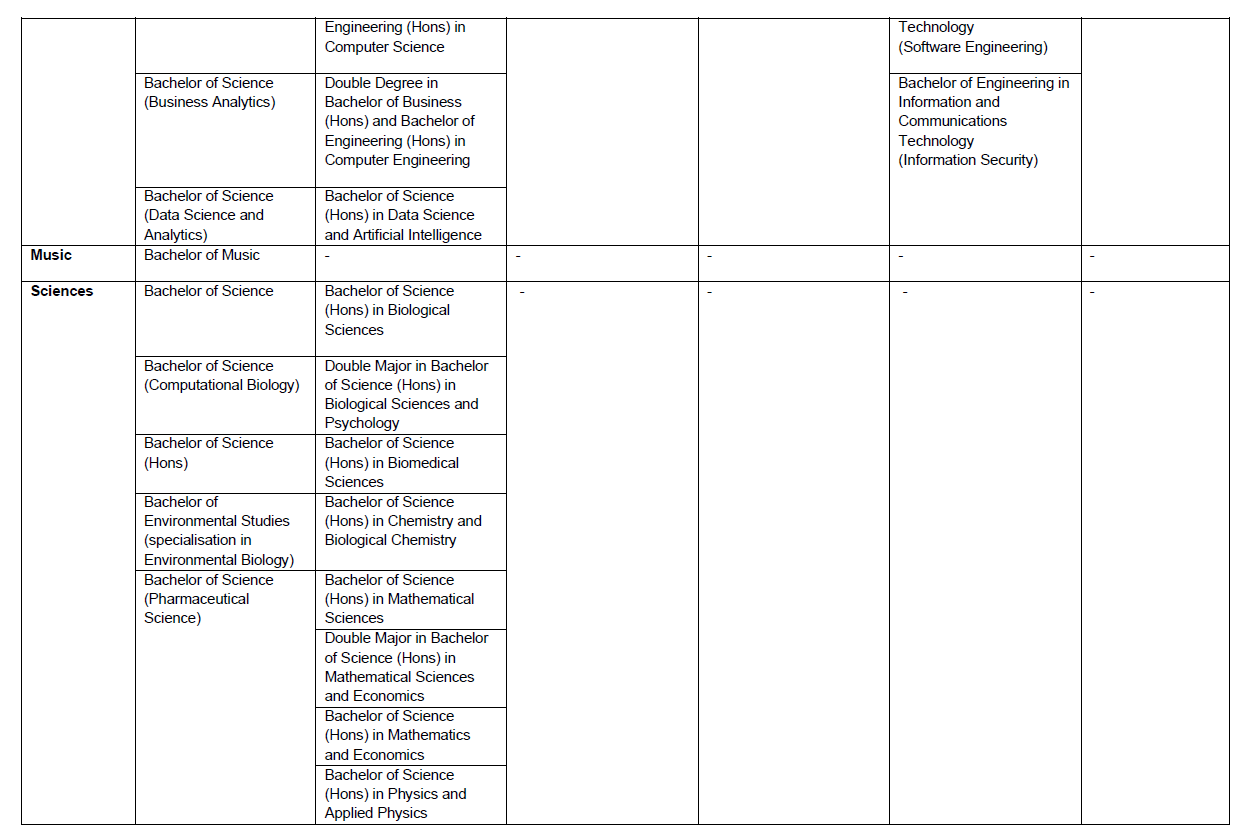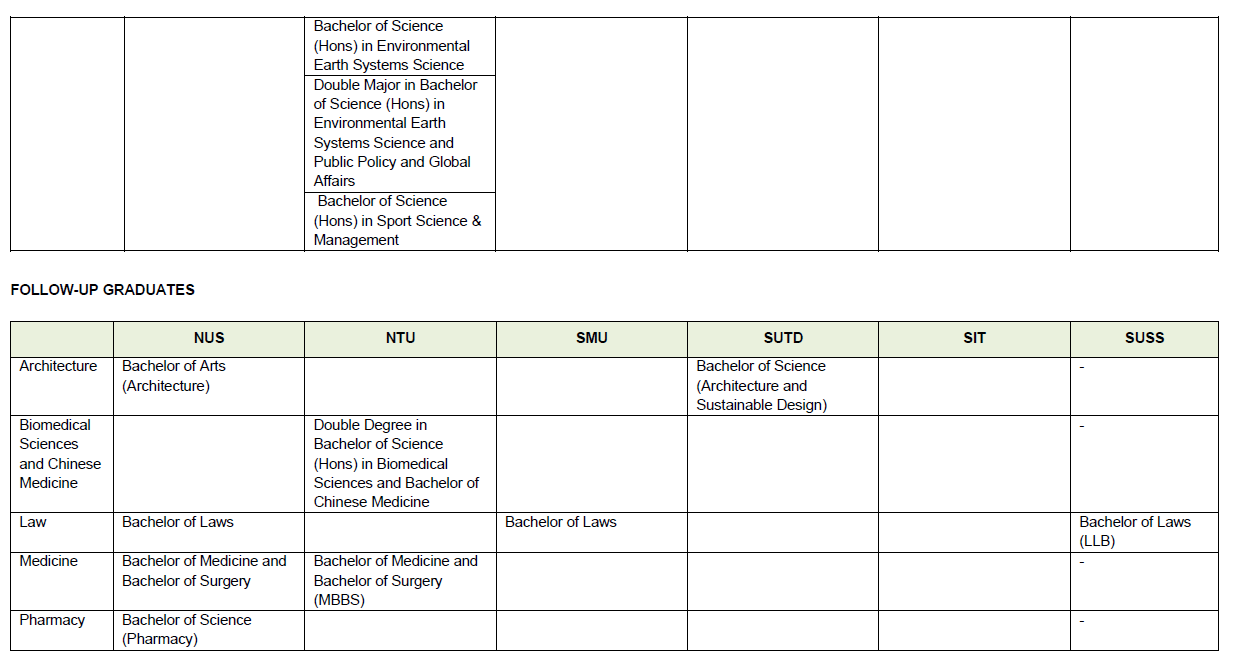1. Singapore, 20 February 2023 – The results from the 2022 Joint Autonomous Universities Graduate Employment Survey (JAUGES)[1] – conducted by National University of Singapore (NUS), Nanyang Technological University (NTU), Singapore Management University (SMU) and Singapore University of Social Sciences (SUSS) – showed that the 2022 cohort of fresh graduates achieved strong employment outcomes as Singapore transitions to living with COVID-19.
Employment Indicators for Fresh Graduates from Full-Time Programmes
2. Some 12,100 fresh graduates from full-time programmes at NUS, NTU, SMU and SUSS participated in the 2022 survey, representing a response rate of 75.8%. They were surveyed on their employment status as at 1 November 2022, about six months after the completion of their final examinations.
3. Of the 10,700 respondents in the labour force[2], 93.8% were employed within six months of completing their final examinations, compared to 94.4% in 2021.3 87.5% of those in the labour force secured full-time permanent employment, compared to 84.0% in 2021. Another 1.8% were freelancing, compared to 1.7% in 2021. The proportion in part-time/temporary employment decreased to 4.5%, compared to 8.7% in 2021. 0.8% were in involuntary part-time/temporary employment in 2022, compared to 3.0% in 2021 (see Table 1 for a breakdown of these figures).
4. The median gross monthly salary[3] among fresh graduates in full-time permanent employment was $4,200, an increase from $3,800 in 2021.
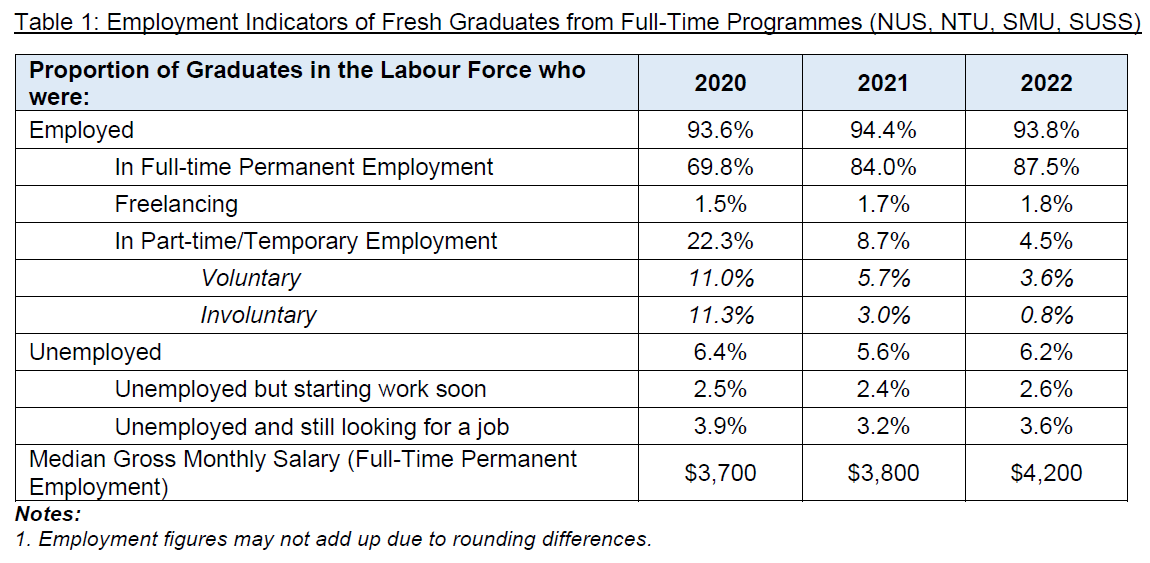
Employment Outcomes by Course Cluster
5. In 2022, the Information & Digital Technologies, Health Sciences and Engineering clusters registered the highest percentage in full-time permanent employment. Median gross monthly salaries for the Arts, Design & Media cluster held steady while the remaining clusters experienced increases in median gross monthly salaries in 2022 (see Table 2).
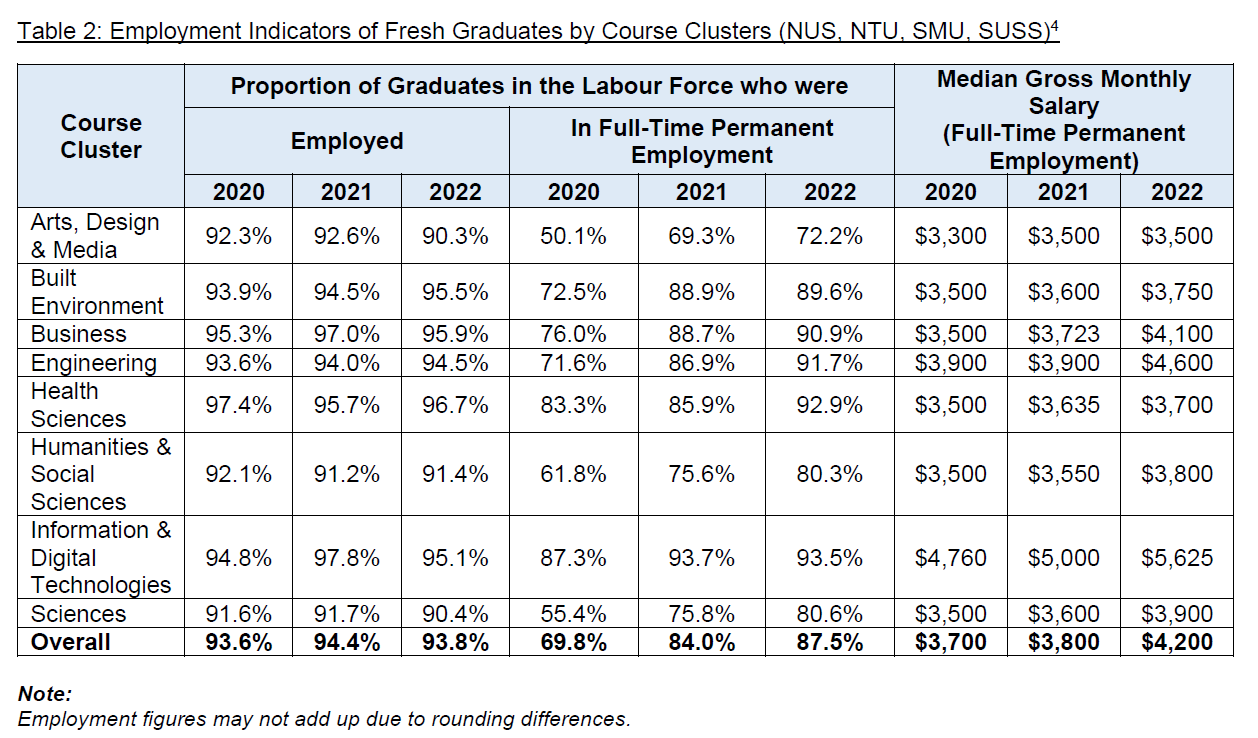
Employment Status of Graduates who Participated in the Follow-up Survey
6. Close to 800 graduates from NUS, NTU, SMU and SUSS participated in the 2022 follow-up survey which surveyed their employment status as at 1 November 2022, representing a response rate of 69.2%. The survey is conducted for courses that typically require post-graduate practical training before the graduates can practise in their professions. These graduates were from:
(i) The Architecture Class of 2019, who took part in the survey upon completion of their practical training, and
(ii) The Biomedical Sciences and Chinese Medicine, Law, Medicine, and Pharmacy courses, who took part in the survey after completing their one-year practical law course, pupilage, or housemanship/first-year residency training upon graduation in 2021.
7. Of those in the labour force, 97.4% were employed after the completion of their practical training/housemanship/first-year residency training, compared to 98.1% in 2021. 94.9% of those in the labour force secured full-time permanent employment, compared to 96.0% in 2021. Another 0.8% were freelancing, compared to 0.3% in 2021. The proportion in part-time/temporary employment decreased slightly to 1.7%, compared to 1.8% in 2021. The proportion who were in involuntary part-time/temporary employment was 0.5% in 2022, compared to 0.4% in 2021 (see Table 3 for a breakdown of these figures).
8. The median gross monthly salary of those in full-time permanent employment was $5,500 in 2022, compared to $5000 in 2021.
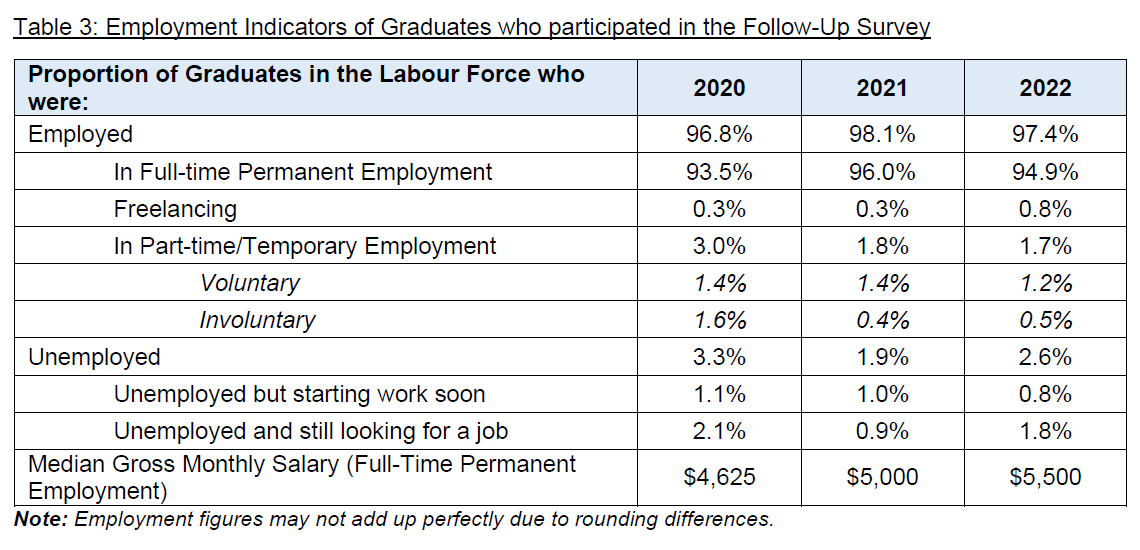
Results for Singapore Institute of Technology (SIT) & Singapore University of Technology and Design (SUTD)
9. As the surveys for SIT and SUTD are ongoing, their survey results will be released at a later date.
_______________
[1] The JAUGES is conducted by the six Autonomous Universities (NUS, NTU, SMU, SUTD, SIT, SUSS) every year to collect information on the employment status of graduates, around six months after the completion of their final examinations. Due to their different academic calendars, NUS, NTU, SMU and SUSS conduct their surveys in November each year, while SUTD and SIT conduct their surveys in February and March respectively.
[2] Graduates in the labour force refer to graduates who are either employed (i.e., working) or unemployed (i.e., not working but actively looking and available for a job).
[3] Refer to Appendix I for the definitions of employment indicators.
[4] Appendix II lists all courses under each course cluster. The survey findings of respective AUs can be found at https://www.moe.gov.sg/post-secondary/overview/autonomous-universities/.
– END –
For media queries and interviews, please contact:
NUS Media Contact
Janice Tay
Assistant Senior Manager
Office of University Communications
National University of Singapore
Email: janice@nus.edu.sg
NTU Media Contact
Foo Jie Ying
Manager,
Corporate Communications Office
Nanyang Technological University
Email: jieying@ntu.edu.sg
SMU Media Contact
Corinne Kang
Assistant Director,
Corporate Communications
Office of Corporate Communications and Marketing
Singapore Management University
Email: corinnekang@smu.edu.sg
SUTD Media Contact
Melissa Koh
Manager (Public Relations),
Office of Marketing and Communications
Singapore University of
Technology and Design
Email: melissa_koh@sutd.edu.sg
SIT Media Contact
Jesmine Ong
Assistant Director,
Corporate Communications
Singapore Institute of Technology
Email: Jesmine.Ong@SingaporeT ech.edu.sg
SUSS Media Contact
Valerie Ng
Senior Manager,
Communications & Marketing
Singapore University of Social Sciences
Email: valeriengww@suss.edu.sg
About National University of Singapore (NUS)
The National University of Singapore (NUS) is Singapore’s flagship university, which offers a global approach to education, research and entrepreneurship, with a focus on Asian perspectives and expertise. We have 16 colleges, faculties and schools across three campuses in Singapore, with more than 40,000 students from 100 countries enriching our vibrant and diverse campus community. We have also established our NUS Overseas Colleges programme in more than 15 cities around the world.
Our multidisciplinary and real-world approach to education, research and entrepreneurship enables us to work closely with industry, governments and academia to address crucial and complex issues relevant to Asia and the world. Researchers in our faculties, research centres of excellence, corporate labs and more than 30 university-level research institutes focus on themes that include energy; environmental and urban sustainability; treatment and prevention of diseases; active ageing; advanced materials; risk management and resilience of financial systems; Asian studies; and Smart Nation capabilities such as artificial intelligence, data science, operations research and cybersecurity.
For more information on NUS, please visit www.nus.edu.sg.
About Nanyang Technological University (NTU)
A research-intensive public university, Nanyang Technological University, Singapore (NTU Singapore) has 33,000 undergraduate and postgraduate students in the Engineering, Business, Science, Medicine, Humanities, Arts, & Social Sciences, and Graduate colleges.
NTU is also home to world-renowned autonomous institutes – the National Institute of Education, S Rajaratnam School of International Studies, Earth Observatory of Singapore, and Singapore Centre for Environmental Life Sciences Engineering – and various leading research centres such as the Nanyang Environment & Water Research Institute (NEWRI) and Energy Research Institute @ NTU (ERI@N).
Under the NTU Smart Campus vision, the University harnesses the power of digital technology and tech-enabled solutions to support better learning and living experiences, the discovery of new knowledge, and the sustainability of resources.
Ranked amongst the world’s top universities, the University’s main campus is also frequently listed among the world’s most beautiful. Known for its sustainability, over 95% of its building projects are certified Green Mark Platinum. Apart from its main campus, NTU also has a medical campus in Novena, Singapore’s healthcare district.
For more information, visit www.ntu.edu.sg
About Singapore Management University (SMU)
A premier university in Asia, the Singapore Management University (SMU) is internationally recognised for its world-class research and distinguished teaching. Established in 2000, SMU’s mission is to generate leading- edge research with global impact and to produce broad-based, creative and entrepreneurial leaders for the knowledge-based economy. SMU’s education is known for its highly interactive, collaborative and project- based approach to learning.
Home to over 12,000 students across undergraduate, postgraduate professional and postgraduate research programmes, SMU comprises eight schools: School of Accountancy, Lee Kong Chian School of Business, School of Economics, School of Computing and Information Systems, Yong Pung How School of Law, School of Social Sciences, College of Integrative Studies and College of Graduate Research Studies. SMU offers a wide range of bachelors', masters', and PhD degree programmes in the disciplinary areas associated with its schools, as well as in multidisciplinary combinations of these areas.
SMU emphasises rigorous, high-impact, multi- and interdisciplinary research that addresses Asian issues of global relevance. SMU faculty members collaborate with leading international researchers and universities around the world, as well as with partners in the business community and public sector. SMU’s city campus is a modern facility located in the heart of downtown Singapore, fostering strategic linkages with business, government and the wider community.
For more information, visit www.smu.edu.sg
About Singapore University of Technology and Design (SUTD)
The Singapore University of Technology and Design (SUTD) is one of the first universities in the world to incorporate the art and science of design and technology into a truly holistic interdisciplinary education and research experience that culminates in real-world design innovations. SUTD seeks to advance knowledge and nurture technically-grounded leaders and innovators to serve societal needs. SUTD also topped a list of emerging engineering schools in the world in a study commissioned by MIT.
A research-intensive university, SUTD is distinguished by its unique East and West academic programmes that incorporate design thinking, human-centred innovation, entrepreneurship, coupled with local and international industry collaborations. SUTD’s key focus areas are Healthcare, Cities, Aviation and Sustainability, with Artificial Intelligence/Data Science and Digital Manufacturing capabilities across all of them. Multiple post-graduate opportunities are available. Skill-based professional education and training courses are also available at SUTD Academy. For more information about SUTD, please visit: www.sutd.edu.sg
The survey period for SUTD will start from 24 February to 10 March 2023.
About Singapore Institute of Technology (SIT)
The Singapore Institute of Technology (SIT) is Singapore’s first University of Applied Learning, offering industry-relevant degree programmes that prepare its graduates to be work- and future-ready professionals. Its mission is to maximise the potential of its learners and to innovate with industry, through an integrated applied learning and research approach, so as to contribute to the economy and society.
The University’s unique pedagogy integrates work and study, embracing authentic learning in a real-world environment through collaborations with key strategic partners. Its focus on applied research with business impact is aimed at helping industry innovate and grow. Targeted to be ready in 2024, SIT’s centralised campus within the larger Punggol Digital District will feature a vibrant learning environment where academia and industry will be tightly integrated with the community.
For more information, visit www.SingaporeTech.edu.sg.
The survey period for SIT will start from 1 March to 14 May 2023
About Singapore University of Social Sciences (SUSS)
SUSS is a university with a rich heritage in inspiring lifelong education and transforming society through social sciences. We develop work-ready graduates and work-adaptive alumni to their fullest potential through our 3H’s education philosophy – ‘Head’ for professional competency with applied knowledge, ‘Heart’ for social awareness of the needs of the society, and ‘Habit’ for passion towards lifelong learning.
We offer over 80 undergraduate and graduate programmes, available in full- and part-time study modes which are flexible, modular and inter-disciplinary, catering to both fresh school leavers and adult learners. SUSS also offers a broad range of continuing education and training modular courses for the professional skills upgrading of Singapore's workforce.
Our programmes and courses are offered by our five schools:
• S R Nathan School of Human Development
• School of Business
• School of Humanities and Behavioural Sciences
• School of Law
• School of Science and Technology
To date, over 42,000 graduates have experienced our unique brand of education, and each year, about 17,000 students are pursuing their full- and part-time studies with us.
The Institute for Adult Learning (IAL), as part of SUSS, leads in the field of research on adult learning to build capabilities of the training and adult education sector in Singapore and beyond.
For more information on SUSS, please visit www.suss.edu.sg .
APPENDIX I: DEFINITION OF EMPLOYMENT INDICATORS
Employment refers to graduates working on a full-time permanent, part-time, temporary employment or freelancing basis.
Full-time Permanent Employment refers to employment of at least 35 hours a week and where the employment is not temporary. It includes those on contracts of one year or more.
Freelancing refers to those who operate their own business without employing any paid worker in the conduct of their business or trade.
Part-time Employment refers to employment of less than 35 hours a week.
Temporary Employment refers to casual, interim or seasonal employment, including those on contracts of less than one year.
Involuntary part-time/temporary employment refers to those who indicated that they were in part- time/temporary employment as they had tried but were unable to obtain a full-time permanent job offer so far.
Voluntary part-time/temporary employment refers to those who indicated that they were in part- time/temporary employment as they were pursuing/preparing to commence further studies, as they were taking active steps to start a business venture, due to personal choice, or other reasons.
Unemployed but starting work soon refers to those who indicated that they were not working as they had accepted a job offer and will start later, or were taking steps to start a business venture.
Unemployed and still looking for a job refers to those who indicated that they were not working but actively looking and available for work.
Gross Monthly Salary comprises basic salary, fixed allowances, over-time pay, commissions and other regular cash payments, before deduction of the employee’s CPF contributions and personal income tax. Employer’s CPF contributions, bonuses, stock options, other lump sum payments and payments-in-kind are excluded.
APPENDIX II: LIST OF COURSE CLUSTERS AND COURSES
